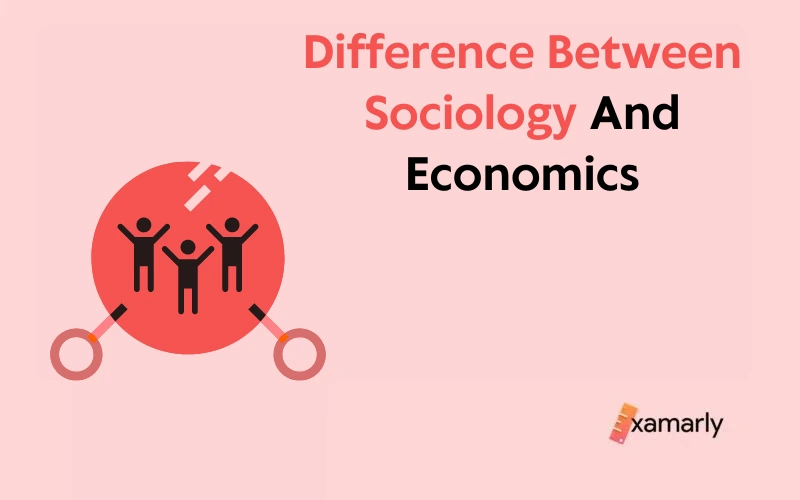Are you trying to understand the difference between sociology and economics but feeling overwhelmed by the jargon and complex concepts? Don’t worry, you’re not alone. Many people are confused about the distinctions between these two fields of study. But understanding the difference is crucial for grasping the intricacies of our social and economic world.
Sociology is the study of human social behavior, while economics is the study of how societies allocate scarce resources to meet their unlimited wants and needs.
On the surface, they may seem unrelated, but they are deeply intertwined, and both have critical implications for understanding our society and the economy.
In this article, we’ll demystify the differences between sociology and economics and explore how they intersect to give us a comprehensive understanding of our world. So, if you’re ready to unravel the complexities of human behavior and economic activity, read on!
- Key Difference Between Sociology And Economics
- What Is Sociology?
- What Is Economics?
- Similarities
- Sociology And Economics
- Importance
- Winding Up
- FAQs On Sociology Vs Economics
- What Is Economic Sociology?
- What Is The Significance Of Sociology In Economics?
- What Is The Relationship Between Sociology And Economics?
- What Are The Common Issues Dealt With In Sociology And Economics?
- What Is The Main Difference Between Sociology And Economics?
- Do Sociology And Economics Have Any Similarities?
- What Are Some Of The Key Concepts Used In Sociology?
- What Are Some Of The Key Concepts Used In Economics?
- Can Sociology And Economics Be Studied Separately?
- How Can Sociology And Economics Be Used Together?
- What Methods Are Used To Study Sociology?
- The Fields Of Sociology And Economics Are How Old?
- What Distinguishes Sociology?
Key Difference Between Sociology And Economics
| Basis of Difference | Sociology | Economics |
|---|---|---|
| Definition | The study of human social behavior and society | It is the branch of knowledge that deals with the study of how societies allocate scarce resources to meet their unlimited wants and needs |
| Scope | Examines social structures, relationships, and institutions | Analyzes the production, distribution, exchange, and consumption of goods and services |
| Focus | The behavior of individuals and groups in a social context. Social stratification, social class, religion, the law, and other topics are traditional sociological foci. | The study of economics focuses on the behavior of various economic components in relation to a certain scenario, as well as the functioning of economies. |
| Branches | Cultural sociology, social stratification, and environmental sociology | Microeconomics and Macroeconomics |
| Social Science | The general part of science | A special branch of social science |
| Slowly, other topics including health, medications, the military, social stigma, the control system, and the importance of social interaction in human development have come under sociology’s focus. | Positive economics and normative economics are two more broad definitions of the discipline of economics. While normative economics focuses on “what should be,” positive economics describes “what is.” | |
| Tools | Surveys, interviews, and experiments | Mathematical models, statistical analysis, and other methods |
| Approach | Sociology is an analytical field in which researchers use a variety of approaches to examine different facets of human behaviour in the setting of groups. | On the other hand, economics makes use of a number of equations to represent the state of economics regulating people, organizations, and economic systems. |
| Purpose | To understand human behavior and social institutions | To understand and predict economic activity |
| Application | Research that is carried out in the field of sociology has an impact on many facets of everyday society and can be found to be useful in the work of politicians, policymakers, educators, and lawmakers. | Applications for economic analysis can be found in government, business, and finance. Even topics like crime, family law, and war have been known to be touched upon. |
| Nature | Sociology research is less precise and is an abstract science. Social aspects are particularly difficult to measure and assess. | Economics is a concrete discipline. Economic variables may be measured and quantified more precisely and easily. |
| Well known | Max Weber and Emile Durkheim are two well-known sociologists. | Raghuram Rajan, Amartya Sen, Abhijit Banerjee, Esther Duflo, and Michael Kremer are notable economists. |
| Father | The works of Auguste Comte (January 19th, 1798 – September 5, 1857) can be used to trace the roots of modern sociology. | Modern economics may be traced back to Adam Smith (15 June 1723–17 July 1790), who is regarded as the “father of modern economics. |
Despite the distinctions highlighted above, sociology and economics are interdependent. Economics, which focuses mostly on the economic side of man, has a direct relationship with social actions in civilizations. Understanding societies, or the behaviors, acts, and activities inside them, is necessary to comprehend the economic lives of human beings.
This is because the economy has a big impact on how these actions and activities are carried out. It directly influences how societies behave. Economic issues also have a significant impact on sociology, which is the study of social beings.
What Is Sociology?
Sociology is the study of human social behavior, relationships, and institutions. It examines how people interact with one another, how societies form and change, and how different social structures and institutions (such as family, education, and religion) shape individuals’ lives and experiences. Sociologists use a variety of research methods to study social phenomena and develop theories about how society functions.
What Is Economics?
Economics is the social science that studies how individuals, businesses, governments, and other organizations allocate scarce resources to satisfy their unlimited wants. It examines how prices are determined, how goods and services are produced and distributed, and how economies grow and change over time.
There are several branches of economics, including microeconomics, which focuses on the behavior of individual consumers and firms, and macroeconomics, which studies the overall performance of an economy, such as the levels of employment and gross domestic product (GDP). The ultimate goal of economics is to understand how economies can best meet the needs of their citizens.
Similarities
Sociology and economics are both social sciences that study human behavior and social phenomena, but they focus on different aspects and have different theoretical perspectives. However, they do share some similarities:
- The study of all dimensions of human growth is the main emphasis of the social science subfields of sociology and economics.
- Both sociology and economics study how people interact with one another, how societies form and change, and how different social structures and institutions shape individuals’ lives and experiences.
- Both sociology and economics use scientific research approaches to study their respective areas of interest.
- Both sociology and economics use similar concepts and theories to explain social phenomena. For example, both disciplines use the concept of “power” to explain how different groups in society influence decisions and shape social outcomes.
- Sociology and economics are linked fields of study. The field of economics, which focuses mostly on issues pertaining to people and their finances, is inextricably linked to the social activities that take place in society. Sociology, the study of human society, is profoundly influenced by economic factors.
- As a discipline, economics is regarded as a branch of sociology, and economics is considered a subfield of social science.
In summary, while sociology and economics are distinct fields, they overlap in many areas and can be used together to analyze and understand complex social phenomena.
Sociology And Economics
All social sciences have their roots in sociology. As a result, it has intimate ties to both Economics and all other social sciences. Sociology and economics have a very deep, personal, and intimate relationship with one another. These two are closely related since social interactions and relationships have a close connection to economic relationships. Similarly, economic links have an impact on social relationships as well. In large part, economic activities are social activities. As a result, they are both mutually related.
Sociology lends a hand in economics. Economics uses sociology as a resource and relies on it for understanding. Since sociology is a component of economics, economics cannot fully understand itself without the aid of sociology. To put it another way, economics is concerned with the material welfare of man, which is the same as the common welfare.
Social welfare includes economic welfare. Economists use sociology and take into account the social events of the moment to solve various economic issues like inflation, poverty, unemployment, and other similar issues.
At the same time, society regulates human economic activity.
Sociologists like Max Weber, Pareto, and others have made significant contributions to economics through their studies.
Aspects of social change that are also considered by economists include economic change.
Economics makes its generalizations using the information that sociology provides.
Thus, without sociology, economics cannot advance or grow.
In a similar way, sociology likewise uses economics as a resource. Economics considerably enhances the understanding of sociology. Every area of social life is heavily influenced by the economy. Since economics is a component of sociology, sociology cannot be fully understood without the aid of economics.
Sociology considerably benefits from the knowledge and research produced in the discipline of economics. Every single social issue has an economic root. Sociologists use economics to help them solve social issues including dowry, suicide, and other related issues.
According to Marx, the foundation of society is made up of economic relations. Every area of human social existence is influenced by economic issues, which is why sociologists study economic institutions. Because of this, sociologists like Spencer, Weber, Durkheim, and others have used economics to aid in their study of social relations.
Thus, there is a strong connection between sociology and economics.
There are several issues that sociologists and economists are both researching.
Social changes follow economic developments and vice versa.
Despite the proximity, interdependence, and dependency indicated above, there are certain differences between the two sciences, which are detailed above.
Importance
Sociology and economics are both important social sciences that provide valuable insights into human behavior and social phenomena.
- Sociology is important because it helps us understand how societies function and how individuals and groups interact with one another. This knowledge is essential for addressing social problems, designing effective public policies, and promoting social justice.
- Economics is important because it helps us understand how societies allocate scarce resources to meet their needs and wants. This knowledge is essential for promoting economic growth, reducing poverty, and creating sustainable development.
- Both disciplines help us understand the causes and consequences of social and economic issues, such as poverty, inequality, discrimination, and unemployment.
- They are also useful in understanding the impact of various factors on our society such as globalization, demographic changes, and technological advancements.
- They are also valuable in assessing the effectiveness of policies and interventions aimed at addressing social and economic issues.
In summary, sociology and economics are both important social sciences that provide critical insights into human behavior and social phenomena. This knowledge is essential for addressing social problems, promoting social justice and economic growth, and creating sustainable development.
Winding Up
In conclusion, sociology and economics are two distinct yet interrelated social sciences that study human behavior and social phenomena from different perspectives. While sociology focuses on understanding how societies function and how individuals and groups interact with one another, economics focuses on how societies allocate scarce resources to meet their needs and wants.
Both disciplines share some similarities in terms of research methods and concepts but have different theoretical frameworks. However, despite their differences, sociology, and economics are both crucial in providing a comprehensive understanding of the complexities of human society and how it functions. Together, they offer a unique and powerful lens through which we can analyze and address the social and economic issues that shape our world.
For additional readings:
FAQs On Sociology Vs Economics
What Is Economic Sociology?
Economic sociology is a subfield of sociology that studies the relationship between economic activity and social structure. It examines how economic processes and institutions shape social interactions, relationships, and institutions, and how social structures and institutions shape economic activity. Economic sociology is an interdisciplinary field that draws on both sociology and economics to provide a more comprehensive understanding of human behavior and social phenomena.
What Is The Significance Of Sociology In Economics?
Sociology is significant in economics in several ways:
It helps to understand the social and cultural factors that shape economic behavior. For example, sociologists study how social norms and institutions influence consumer behavior, while economists focus on how prices and market forces influence consumer behavior.
It helps to understand the impact of economic changes and policies on different groups in society. For example, sociologists study how economic inequality affects social mobility, while economists study how tax policies affect income distribution. It helps to understand the role of social networks and social capital in economic activity. Economic sociologists study how social connections and trust affect business transactions and economic outcomes, while economists focus on how markets and economic incentives affect these outcomes. It helps to understand the role of institutions in shaping economic activity. Economic sociologists study how formal and informal institutions shape economic behavior, while economists focus on how market forces shape economic behavior. It helps to understand how economic activity is embedded in society and culture. Economic sociologists study how economic activity is shaped by cultural values, beliefs, and norms, while economists focus on how market forces shape economic activity. In summary, sociology provides a valuable perspective on economic activity, which can complement and enrich the perspective provided by economics. By studying the social and cultural factors that shape economic behavior, economic sociology allows us to have a better understanding of the complexities of human behavior in the market and in the economy, and therefore, contribute to better economic policies.
What Is The Relationship Between Sociology And Economics?
Sociology and economics are two distinct yet interrelated social sciences that study human behavior and social phenomena. Sociology focuses on understanding how societies function and how individuals and groups interact with one another, while economics focuses on how societies allocate scarce resources to meet their needs and wants. Both disciplines use similar research methods and concepts but have different theoretical frameworks. Despite their differences, sociology and economics are both crucial in providing a comprehensive understanding of the complexities of human society and how it functions. Together, they offer a unique and powerful lens through which we can analyze and address the social and economic issues that shape our world.
What Are The Common Issues Dealt With In Sociology And Economics?
Sociology and economics both deal with issues related to human behavior and social phenomena, such as:
a. Social inequality and poverty
b. Race and gender discrimination
c. Employment and unemployment
d. Education and skills development
e. Family and household dynamics
f. Social mobility and class structure
g. Political and economic institutions
h. Health and well-being
i. Consumption and production
j. Economic growth and development.
Both disciplines also share a common goal of understanding the causes and consequences of these issues and how they can be addressed through public policies and social interventions.
What Is The Main Difference Between Sociology And Economics?
The main difference between sociology and economics is that sociology focuses on understanding how societies function and how individuals and groups interact with one another, while economics focuses on how societies allocate scarce resources to meet their needs and wants.
Do Sociology And Economics Have Any Similarities?
Yes, sociology and economics have some similarities in terms of research methods and concepts but have different theoretical frameworks. Both disciplines also share a common goal of understanding human behavior and social phenomena.
What Are Some Of The Key Concepts Used In Sociology?
The study of the science of society and social relationships is known as sociology. Some key concepts used in sociology include social structure, culture, power, social inequality, socialization, and social institutions.
What Are Some Of The Key Concepts Used In Economics?
Economics is the study of various economic aspects. Some key concepts used in economics include supply and demand, markets, scarcity, opportunity cost, and economic growth.
Can Sociology And Economics Be Studied Separately?
Yes, sociology and economics can be studied separately, but studying them together can provide a more comprehensive understanding of human behavior and social phenomena.
How Can Sociology And Economics Be Used Together?
Sociology and economics can be used together to analyze and understand complex social phenomena. For example, economists use sociological data to study the impact of social factors on economic behavior, while sociologists use economic data to study the social impact of economic policies and institutions.
What Methods Are Used To Study Sociology?
Sociology is studied using both quantitative and qualitative methods, and numerous methods are used to collect data.
The Fields Of Sociology And Economics Are How Old?
Economics is older than Sociology, which makes Sociology the youngest field of social science.
What Distinguishes Sociology?
In contrast to other social sciences, which are more specialized, sociology is more general and examines human relationships from a wider perspective. The scientific study of human relationships, including their institutions and interactions, is what sociology is all about.






